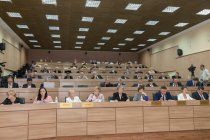 Русский
Русский English
English-







Victor Guzun, "We are waiting for honest attitude"
The Supreme Council considered a legislative initiative developed by a group of Deputies of the Parliamentary Committee for the Development of Entrepreneurship and Industry, which provides for the modification of one of the norms of the Code on Administrative Violations. We are talking about the appointment of fines for violations of the established procedure for conducting individual entrepreneurial activities.
As explained by one of the authors of the law-in-draft, the chairman of the profile committee Victor Guzun, there is penalty "range" - from 50 to 450 MW installed in the republic for this type of administrative violations today, while small minor missteps in the work are put in one row with evasion from payment of the main for an individual entrepreneur document - a patent.
The essence of the legislative initiative is, on the one hand, to differentiate the penalties depending on the significance of the violation, on the other - to establish a fixed penalty for conducting activities without a patent.
In the course of the discussion, Victor Guzun recalled that the idea put forward by the committee's deputies back in 2012 was to create optimal conditions for doing business, removing it from the shadows by eliminating bureaucratic barriers and excessive control measures, but at the same time setting maximum fines, encourage entrepreneurs to conduct business honestly. In this case, adopted in 2014 and the current version of the norm of the Administrative Offenses Code did not reflect the conceptual approach: minimum penalty may be imposed for the absence of a patent.
The law-in-draft provoked a healthy discussion. Opinions were divided. A number of parliamentarians, including the Parliamentary Committee on Legislation on this issue, spoke out against the legislative initiative, arguing that this could have a negative impact on the dynamics of growth in entrepreneurial activity, which, after the adoption of incentive measures, has only just begun. Other legislators have expressed confidence that the change in the norm of the Code of Administrative Offenses will in no way affect those who conduct entrepreneurial activities in good faith. Anatoly Frunza, Chairman of the Trade Union of Entrepreneurs of Pridnestrovie, convinced many parliamentarians of the need to adopt the initiative. It's no secret that representatives of small businesses actually fall into two main categories: those who always buy out a patent and conduct business honestly, and those who seek loopholes in law to break it.
As a result, the law-in-draft won a majority of votes and was adopted in the first reading. In the second reading mode, parliamentarians will discuss the size of the rates of the proposed types of fines.







